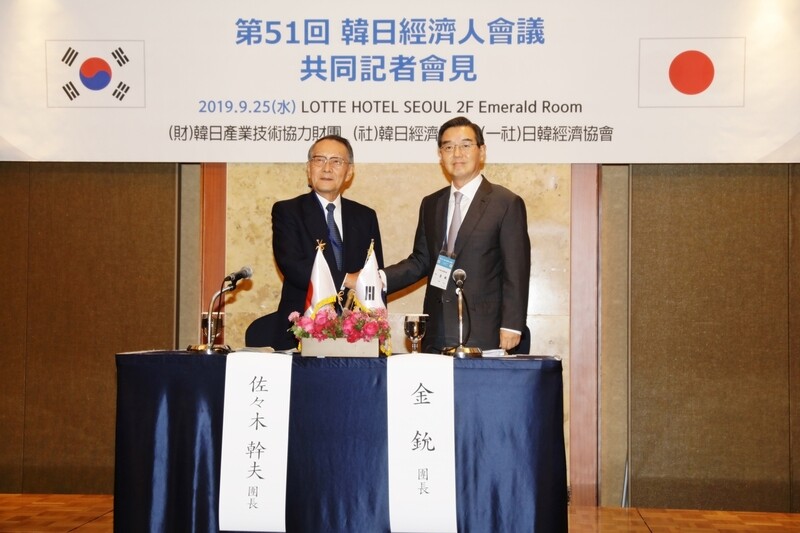hankyoreh
Links to other country sites 다른 나라 사이트 링크
S. Korean, Japanese business leaders call for Tokyo-Seoul dialogue regarding export controls

South Korean and Japanese business leaders are demanding that their governments engage in dialogue amid a strain on relations due to Japan’s intensified export controls. Observers are watching to see whether the calls will lead to a change in attitude from Tokyo, which has so far ignored Seoul’s requests to participate in dialogue.
A joint statement urging dialogue between the South Korean and Japanese governments was adopted by business leaders from both sides on Sept. 24 at the closing ceremony of the 51st Korea-Japan Business Conference, held jointly at the Lotte Hotel in Seoul by the South Korea-based Korea-Japan Economic Association and the Japan-based Japan-Korea Economic Association. In the statement, they said, “We strongly desire the development of appropriate measures to open new horizons in South Korea-Japan relations through the encouragement of dialogue between the two governments so that their political and diplomatic relationship does not become a stumbling block to cooperation between companies on both sides.”
In a press conference after the ceremony, Mikio Sasaki, president of the Japan-Korea Economic Association and a special advisor for the Mitsubishi Corporation, said, “We obviously feel it is inappropriate for governments to proceed without addressing this.”
“They should be pursuing dialogue objectively, not responding emotionally,” he added. When asked if he intended to ask the Japanese government to engage in dialogue with the South Korean government, he said, “I intend to amply explain the content of [this] agreement to related Japanese government offices for the sake of both sides’ economic development.”
An earlier discussion also saw participants expressing the hope that the two governments would pursue dialogue and refrain from responding emotionally. Tomoyuki Moriyama, president of Mitsui & Co. Korea, said, “Boycott campaigns by certain local governments and the cancellation of exchange events with Japan have thrown further cold water on relations between the two sides.”
“There needs to be dialogue between the two governments,” he urged. Although his message assigned blame to South Korea for “responding emotionally” with its boycotts and other actions, the conclusion calling for intergovernmental dialogue was the same.
Kim Yoon, president of the Korea-Japan Economic Association and chairman of Samyang Holdings, said, “I’d like for the two governments to improve their relationship, whatever that entails.”
“The boycotts really are unfortunate,” he lamented.
First held in 1969 four years after the normalization of diplomatic relations between South Korea and Japan, the Korea-Japan Business Conference has continued on an annual basis. This year’s event was originally scheduled to take place in May, but was postponed due to souring relations between Seoul and Tokyo before finally being held in Seoul on Sept. 24–25. The next conference is scheduled to take place in Japan in 2020.
By Choi Ha-yan, staff reporter
Please direct comments or questions to [english@hani.co.kr]

Editorial・opinion
![[Correspondent’s column] China-Europe relations tested once more by EV war [Correspondent’s column] China-Europe relations tested once more by EV war](https://flexible.img.hani.co.kr/flexible/normal/500/300/imgdb/original/2024/0628/7617195640940814.jpg) [Correspondent’s column] China-Europe relations tested once more by EV war
[Correspondent’s column] China-Europe relations tested once more by EV war![[Correspondent’s column] Who really created the new ‘axis of evil’? [Correspondent’s column] Who really created the new ‘axis of evil’?](https://flexible.img.hani.co.kr/flexible/normal/500/300/imgdb/original/2024/0628/4017195633070654.jpg) [Correspondent’s column] Who really created the new ‘axis of evil’?
[Correspondent’s column] Who really created the new ‘axis of evil’?- [Editorial] Exploiting foreign domestic workers won’t solve Korea’s birth rate problem
- [Column] Kim and Putin’s new world order
- [Editorial] Workplace hazards can be prevented — why weren’t they this time?
- [Editorial] Seoul failed to use diplomacy with Moscow — now it’s resorting to threats
- [Column] Balloons, drones, wiretapping… Yongsan’s got it all!
- [Editorial] It’s time for us all to rethink our approach to North Korea
- [Column] Why empty gestures matter more than ever
- [Editorial] Seoul’s part in N. Korea, Russia upgrading ties to a ‘strategic partnership’
Most viewed articles
- 1Yoon echoed conspiracy theories about Itaewon disaster, former National Assembly speaker says
- 2After 7 years, South Korea resumes live-fire drills on islands a stone’s throw from North
- 3Dreams of a better life brought them to Korea — then a tragic fire tore them apart
- 4[Correspondent’s column] Who really created the new ‘axis of evil’?
- 5S. Korea joins US, Japan for first multi-domain drills at a time of escalating tensions
- 6Yoon-picked brass of anti-corruption agency pushed to end probe over first lady’s Dior bag scandal
- 722 years later, Korean girls killed by US troops remain a symbol of the price of military tensions
- 8Korea declares ‘national emergency’ over birth rates, but offers few new solutions
- 9Seoul hints at lethal weapons aid to Ukraine to put pressure on Russia
- 10US nuclear-powered carrier arrives in Busan for drills with South Korea, Japan